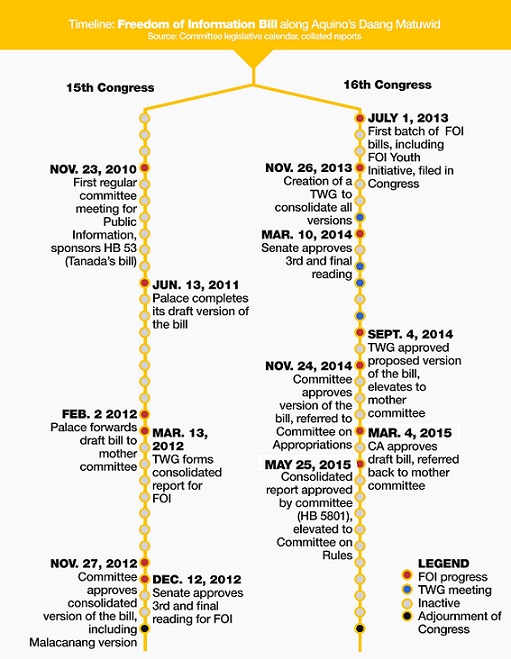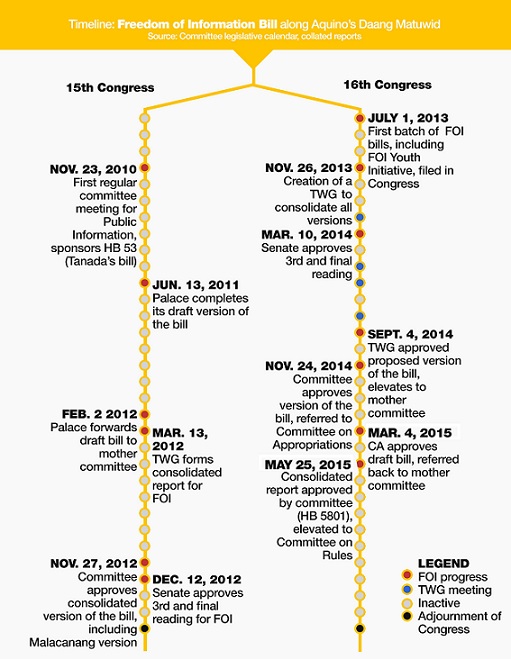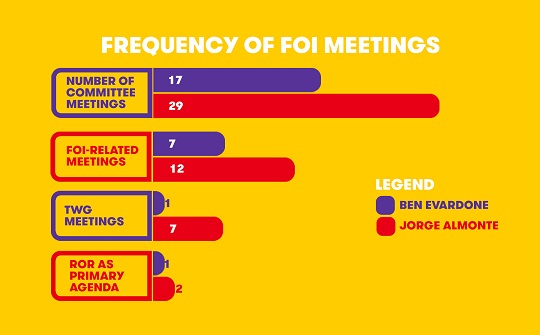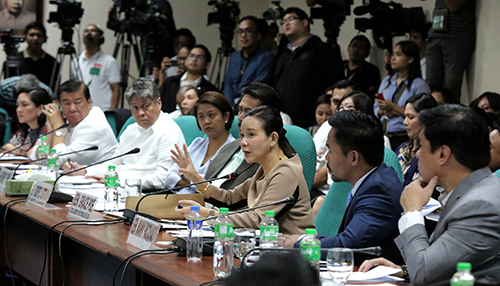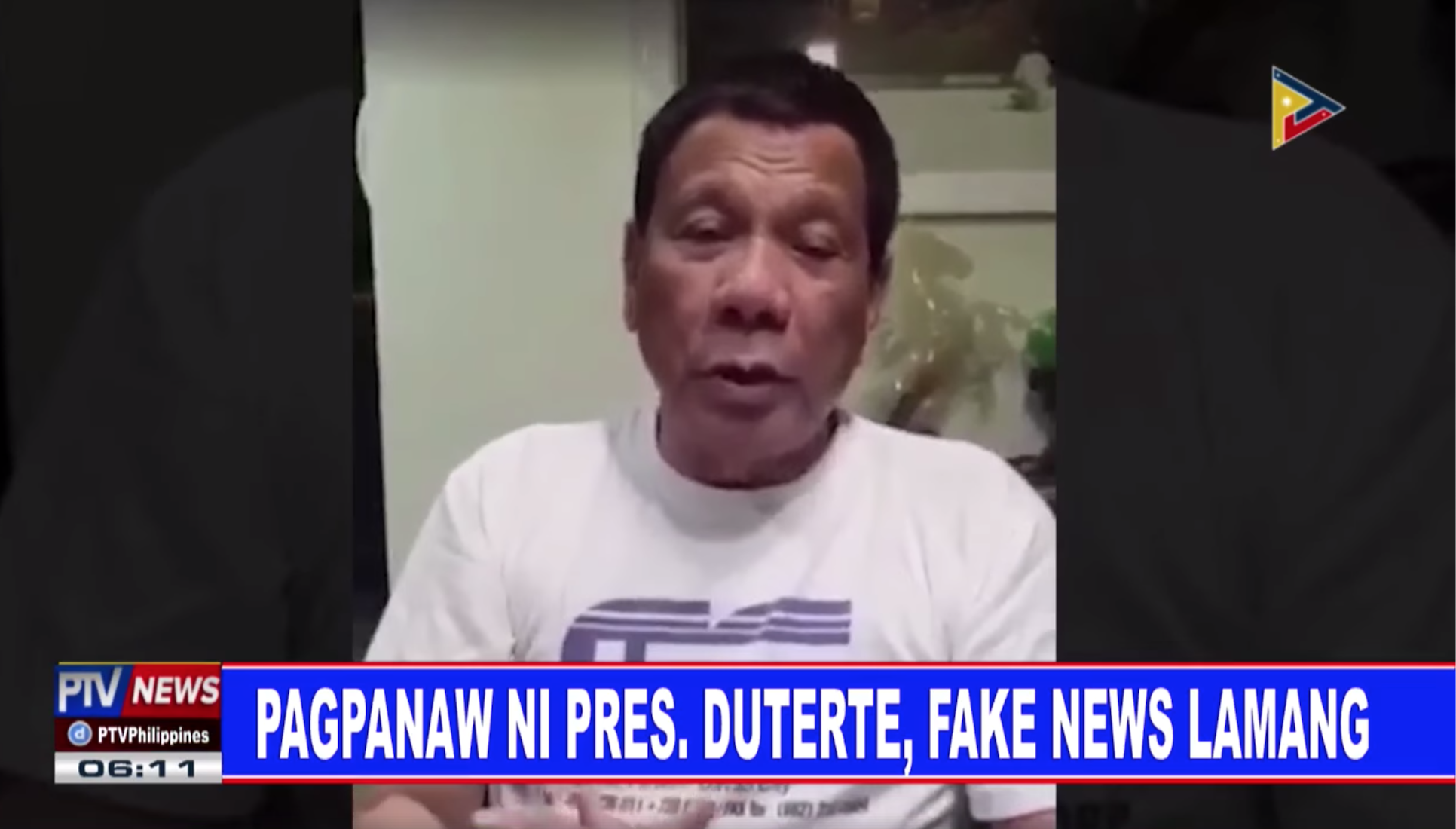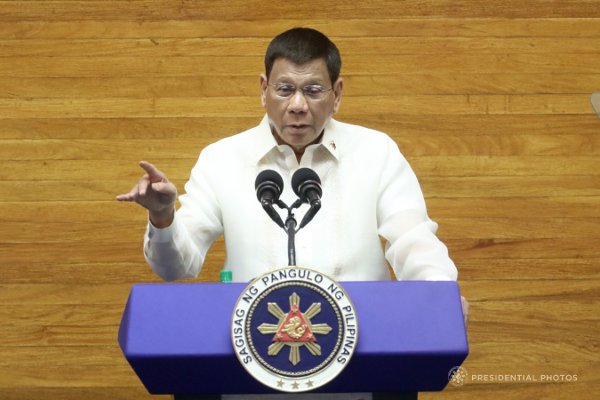By BRYAN EZRA GONZALES, MATTHEW REYSIO-CRUZ and KRIXIA ZHIENELLE SUBINGSUBING
INCOMING president Rodrigo Duterte has promised to issue on his first day in office an executive order mandating Freedom of Information (FOI), the first of what appear to be several marching orders for his administration.
Although an executive order would be limited only to the executive department, advocates see a possible commitment to the passage of an FOI law, which would have far-reaching effects and impose public disclosure on all branches of government.
As FOI advocates await Duterte’s first day in office, they cannot help but be reminded that outgoing President Benigno Aquino had promised during his campaign six years ago to pass an FOI law, yet never lifted a finger to get it passed or have it certified it as a priority measure during his term.
As he bows out of office, Aquino and his allies in Congress, FOI advocates say, actually killed the FOI bill, which was supposed to be the linchpin of his anticorruption crusade.
Turnaround
Six years ago, Aquino raised the hopes of FOI advocates by promising to support the legislation. His Daang Matuwid rhetoric guaranteed an administration built on transparency and good governance, and an FOI Act would provide greater public access to government records and transactions.
A month before he was sworn into office in 2010, then Senator Aquino signed and co-sponsored Senate Resolution 1565, urging the House of Representatives to ratify the bicameral conference committee report before the adjournment of the 14th Congress.
The resolution underscored the need for an FOI law “that will empower our people and contribute decisively to the transformation of our governance landscape.”
The bill appeared ripe for passing when the Aquino administration signed the Open Government Partnership (OGP) in 2011. Spearheaded by the US, the OGP is a multilateral initiative that aims to secure government commitments to scale up transparency, accountability and public participation. Malacanang submitted to the initiative a 10-page action plan that included a pledge to pass the FOI bill by the end of 2015.
But that same year, there were indications the President was backtracking on his commitment and sending the message to allies in Congress.
“Having a freedom of information act sounds so good and noble but at the same time—I think you’ll notice that here in this country—there’s a tendency to get information and not really utilizing it for the proper purposes,” he said in an open forum of a meeting of Southeast Asian business leaders.
Some FOI advocates say the President’s turnaround did not surprise them. While he was still a senator, a source said, FOI advocates asked him to be the bill’s counterpart sponsor in the Senate. They attempted to set at least three meetings with him, to no avail.
Stalled in the House
For the past 28 years, legislators have been introducing a Freedom of Information bill in Congress. The Senate passed its version of the FOI in the 14th, 15th and 16th Congress. The measure, however, stalled at the House of Representatives.
At the start of the 16th Congress, Speaker and Liberal Party (LP) stalwart Feliciano Belmonte said, “Bitayin ninyo ako kung matapos ito at hindi pa nakakapasa (If the FOI bill does not pass, you can hang me).”
During the first half of the Aquino administration, the House saw 24 versions of the bill, all of which were referred to the Committee on Public Information, then headed by incumbent Eastern Samar Rep. Ben Evardone, a former journalist and an administration party member.
Evardone had been editor-in-chief of The Dawn, the official student publication of the University of the East. An activist who went https://www.acheterviagrafr24.com/achat-viagra-pour-homme-vendre/ underground during martial law, he became a news reporter of Ang Pahayang Malaya, a national daily known for its critical stance against the Marcos regime.
Quezon Rep. Lorenzo Tañada III, former Deputy Speaker and co-author of the FOI bill, blamed Evardone for the nonpassage of the bill during the 15th Congress. He said the former newsman was “dribbling” the bill to delay its passage and called him a “complete disappointment.”
Under congressional rules, a House committee is allowed to meet twice a month, equivalent to least 26 meetings in three years. Under Evardone, the committee on public information discussed the FOI bill only seven times.
Tanada said Evardone cancelled meetings with “excuses” that ranged from the non-availability of a meeting room in Congress to a Christmas party for senior citizens in his district that he had to attend.
Evardone could have asked his vice chairman to preside over the meeting but never did, added Tanada.
Evardone dismissed Tanada’s allegations as “unfair accusations,” saying he, too, had wanted to pass the bill under his leadership, but had to deal with competing amendments proposed by different national agencies.
He noted that the Securities and Exchange Commission, Department of Defense and the National Security Council all wanted to impose more restrictions, especially with government transactions and records relating to national security. Left-leaning groups such as Bayan Muna are opposed to the suggested amendments because these would go against the essence of an FOI bill, Evardone said.
He said the delays in the committee hearings were due to the long process of consolidating the bills.
But when the committee report was finally out in March 2012, Evardone still did not calendar a hearing, Tanada pointed out.
Disgruntled with Evardone’s foot-dragging, at one point committee members planned to stage a coup against him. Belmonte dissuaded them from doing so, promising to speak with Evardone himself.
The bill finally got through the committee level on Dec. 12, 2012, a few months before the midterm elections, with 11 ayes and three nays. FOI never got past the plenary and had to be refiled in the 16th Congress.
Palace version
While Congress is an independent branch of government, it is no secret that Malacanang wields tremendous influence over the legislature, particularly the House of Representatives.
The controversial sin tax and Reproductive Health bills hurdled all the obstacles in Congress with the Executive actively leading the fight. President Aquino reportedly called up congressmen in 2012 to muster support to pass the RH Bill, which the Catholic Church strongly opposed up to the end.
The President never gave the FOI bill the same treatment, according to Ifugao Rep. Teodoro Baguilat, a member of the administration party and co-author of the FOI in the 15th and 16th Congress.
Evardone said he never received any instructions or calls from President Aquino or from Speaker Belmonte and Majority Floor Leader Neptali Gonzales Jr.
What Malacanang did was to draft its own version of the FOI that “would balance legitimate needs for secrecy with the public’s right to know.”
Headed by Budget Secretary Florencio “Butch” Abad, the interim group that drafted the Palace version of the FOI was composed of Communications Undersecretary Manuel L. Quezon III, Presidential Spokesperson Edwin Lacierda, and Deputy Presidential Spokesperson Abigail Valte, in coordination with its stakeholders.
The incorporation of a Palace-endorsed version was supposed to help expedite the passage of the bill in the 15th Congress.
But waiting for and integrating the Malacanang version into the mother bill was a major cause of delay during the 15th Congress, Evardone said. The Palace forwarded its draft to the committee eight months after it was supposedly finished.
Tanada’s political fate, however, appeared to be the strongest indication of Malacanang’s real position on the FOI. An original Liberal Party member and already on his last term as congressman, he was left out of the administration’s 2013 senatorial slate despite his expressed interest in running for higher office.
“If you push hard, you will not only get the attention of the President and the spokesperson, you may also earn their ire. I suffered the political cost. If you believe in something, you have to stick your neck out,” said Tañada, who is now with the private sector.
Stuck in the Committee on Rules
At the 16th Congress, the consolidated version of the 24 FOI bills or House Bill 5801 sailed through the committee deliberation with nine months to go before Congress was to adjourn. But the bill got stuck at the Committee on Rules, which was responsible for putting it on the calendar for plenary debate.
LP stalwart Majority Floor Leader Gonzales headed the Committee on Rules.
According to committee secretary Joven Marcelang, Gonzales failed to put the FOI bill on the agenda when it was referred to the Committee on Rules the committee chair wanted to take it up first with the Speaker.
Marcelang said nothing moves into plenary without the green light from Gonzales and Belmonte. But when asked about it, Belmonte said it was up to Gonzales.
“It’s like we were really being passed around,” Mariquit Melgar, former Akbayan Rep. Walden Bello’s chief of staff, said in Filipino. “It’s not just that they weren’t committed. Even after all the dialogues with them, nothing was happening.”
Nepomuceno Malaluan, convenor of Right to Know, Right Now! (R2KRN), a coalition of FOI proponents and lobby groups, said his group learned that both Belmonte and Gonzales were “unhappy” with the bill moving forward.
Melgar recalled hearing that Belmonte was upset when Dinagat Island Rep. Arlene Bag-ao, an FOI proponent, managed to steer the FOI bill from the subcommittee level to the mother committee during the 16th Congress.
Belmonte’s legislative team denied such reports, saying the Speaker only wanted careful and exhaustive discussions on the bill to ensure that the House of Representatives would pass a balanced and responsible FOI bill with widespread support from its members.
Lawmakers’ fears
Much of the resistance to FOI stemmed from congressmen’s fears that providing unbridled access to information would run against their own interests and could be prone to media abuse.
“Even the President says some people do not know how to handle information in the first place. Will they really be responsible enough? And they could clog FOI’s passage by simply bringing that up,” an insider said.
This was exactly what happened in the 15th Congress, when Nueva Ecija Rep. Rodolfo Antonino of the LP coalition stalled committee votes by repeatedly bringing up previously settled matters on the right of reply (RoR) provision, which exhausted much of the committee’s time.
In essence, the RoR rider mandates that media provide equal space and time for replies of subjects of negative news reports. Media is against the RoR provision.
There are already codes of ethics in place, such as the Kapisanan ng mga Brodkaster ng Pilipinas (KBP) and Society of Professional Journalists (SPJ) codes of ethics, that are tantamount to the same thing, said Nonoy Rubrico, supervising legal staff of the Committee on Public Information.
One of the biggest stumbling blocks to the FOI bill is the perception that only the media would benefit from the enactment of the proposed law.
Tanada believes otherwise. “The FOI bill is not necessarily just anti-corruption. It gives the citizen the capability to make informed choices on any issue. What we can only do is make it easier for them: how they use it is their own.”
No LP stand
In his six years in office, not once did President Aquino proclaim the FOI as a priority measure in his State of the Nation Address, save for a passing mention in the 2016 budget message.
In December 2015, in the twilight of Aquino’s presidency, the FOI was item No. 8 on the President’s Legislative Agenda. It was classified as a shared priority measure of the Executive and the Legislative, an apparent response to the public clamor for an enabling law to implement the freedom of information enshrined in the 1987 Constitution.
“You can’t help but get the feeling that FOI was not that important. Some people say that the President’s support is only a form of tokenism,” said Ifugao’s Baguilat, co-author of the bill in the 15th and 16th Congress.
Sources pointed to the absence of a party vote or stand in the Liberal Party to explain the apparent dissonance insofar as the FOI was concerned. Many FOI advocates within the LP themselves cited administration colleagues, Aquino, Belmonte, Gonzales and Evardone, as major stumbling blocks to FOI.
Although he had pledged to make FOI a priority if elected to the highest office, presidential runner-up Mar Roxas defended President Aquino’s inaction on the measure, saying he was “not pushing (FOI) to take into consideration (the media’s) view against right to reply.”
LP member and vice presidential candidate Leni Robredo, who co-authored one of the proposed FOI measures in the House of Representatives, said she still had hope that FOI could pass during the 16th Congress.
But Malaluan said the bill’s passage in the 16th Congress would take a “legislative miracle.”
Congress resumed its session on Monday to convene on Tuesday the National Board of Canvassers, which will proclaim the winning presidential and vice presidential candidates. Congress will adjourn on June 10.
As Duterte has promised to uphold FOI and Robredo stands good chance of winning the vice presidency, advocates welcomed the renewed commitment to the measure.
A carefully crafted executive order on FOI, they said, can help address administrative hurdles to public access to information in the executive department.
Advocates, however, remain hopeful for the legislation of FOI law, that will “apply equally to other branches of government and to independent constitutional bodies, lays down narrow exceptions, and defines penal provisions, that cannot be covered by an EO.”
But, until decisive support is mustered for the bill’s passage, FOI would remain a broken promise.
(The authors are University of the Philippines-Diliman journalism majors who submitted a version of this story to their Journ 105 (Investigative Journalism) class under VERA Files trustee Yvonne T. Chua. This is an updated version.)
